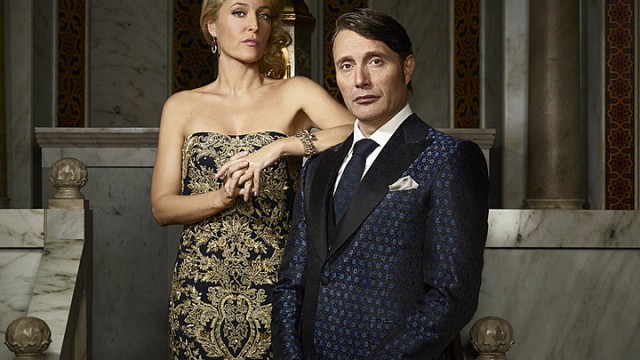Hannibal Lecter is on vacation.
Hannibal is not. It is still serving up the same sumptuous visuals, brilliant character work, and tense thrills as it did in its first two seasons.
This is not to say that some ingredients haven’t changed in the Hannibal recipe. Spending an hour witnessing the European escapades of Dr. and Mrs. Fell is in many ways a far cry from the first episode of the series, which spent twenty minutes in the world of Will Graham and the FBI before introducing the good Doctor Lecter. And this is a different Lecter than we’ve seen before. He is freer, in a way, but this seems to have made him both energetic and more lonely.
The last time we saw Hannibal with Will Graham, the two men were at the ebb of their relationship — so far, at least. And when the low point of your friendship is NOT when you’ve realized your best friend and psychiatrist have framed you for multiple murders, then your low point is very low indeed. Will Graham lay on Hannibal’s kitchen floor, seriously bleeding and left to die while watching the death of Abigail Hobbs, the surrogate daughter he held so dear.
And yet, in those climactic moments of season 2, it seemed to be that Hannibal Lecter was the one who was most disillusioned. In his mind, at least. He thought he had found a kindred spirit in Will, and when he realized that Will wanted to put him away, Hannibal seemed to emotionally place his friend/patient in the deepest circle of his own personal hell. For Hannibal, this episode made clear, Will is a traitor, a Judas Iscariot who committed the foulest sin of them all — he betrayed God. And Hannibal always positioned himself as a kind of god.
This is not the most action-packed or viscerally thrilling episode of the series, but instead offered viewers a chance to observe Hannibal Lecter when he’s away from the world that we know: away from the FBI, away from Baltimore society, and most importantly, away from the traitorous Will Graham, who is the worst kind of ex-boyfriend in Hannibal’s eye.
And yet what’s most vexing about an ex is not how betrayed you feel, but how much you long for the old relationship to come back. You want to wake up from a bad dream, and see the one you love standing there before you, just as they once did. Will had a moment like that, seeing Abigail Hobbs — dead, dearly departed Abigail Hobbs — standing before his eyes, unmutilated for a few brief moments. And in flashbacks to Dr. Lecter’s last supper with Abel Gideon, the audience — if not Hannibal himself — was reminded of who it was that Hannibal most longed for in the world. And conjugal arrangements aside, it was not Bedelia Du Maurier who was Hannibal’s true partner, but Will Graham, the man who can think like a psychopath. Like Hannibal Lecter.
I have few doubts that we will learn a lot more about Bedelia’s complicated and no doubt tortured psyche in weeks to come, but for now it seems that she does not quite have the heart for the role Hannibal wants her to play. For as much as Dr. Lecter tries to prod and persuade her in this episode’s ending, she is not quite “participating” in Hannibal’s designs so much as she is prisoner to them. For now, at least.
This was a colder episode than usual, in that it lacked the more emotional figures of Will, Jack, Alana, etc. Mads Mikkelsen’s pitch perfect portrayal of Hannibal the Cannibal has been a much more subdued and quiet one than filmgoers and TV watchers have been used to. And as we’re still learning about Dr. Du Maurier, who is quite subdued and cold herself, this was a relatively low-key episode of the show. In past seasons, Bryan Fuller and company have balanced Hannibal Lecter’s coldness and emotional mystery with Will Graham’s fragile, coming-apart-at-the-seems instability. Although that particular dynamic was not really present in “Antipasto,” Hannibal was still able to provide some greater emotional frequency by including flashbacks with Dr. Gideon, played as always with scenery-chewing fun by Eddie Izzard. Gideon is a nice counterpoint to Lecter, with his emotional openness and his more clearly apparent psychosis, and Izzard’s bizarre and unplaceable “American” accent is an unironic delight to listen to. The Hannibal directors, in this case Vincenzo Natali, have always used engaging visual tricks to both orient and disorient the audience, and in this episode, Natali cleverly utilized multiple aspect ratios to “place” each flashback in its proper context. The Lecter-Gideon scenes are in black-and-white, in the widest aspect ratio, and the flashbacks featuring Dr. Du Maurier are in color and in a slightly more vertical aspect ratio, while the “present” is shown in more square-like spaces better suited to showing off the grandeur of Florentine architecture on TV screens.
I would predict that the next episode will be heavy on Graham (assuming he’s alive) and the rest of the FBI, and may not even feature the Good Doctor at all. To see where things go from here will be a treat, as Bryan Fuller and his crew have effectively cut the strings of the marionette that Dr. Lecter has played the past two seasons, and have re-piloted the show all over again. With the antipasto out of the way, it should most appetizing to begin the main course.


